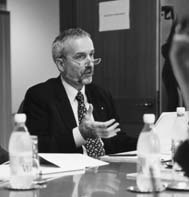Personal tools
News from ICTP 97 - Commentary

IAEA's liaison officer with ICTP speaks about his department's broad mandate in nuclear science and technology as well as the Agency's close ties with the Centre.
Agency Ties
International Atomic Energy Agency's
(IAEA) Department of Nuclear Sciences and Applications may not
be in the headlines as often as other IAEA departments--for example,
those involved in issues related to nuclear energy and the non-proliferation
of nuclear weapons. The department, nonetheless, is involved in
a vital part of the IAEA's mission to promote peaceful uses of
nuclear techniques to meet basic human needs. Our broad-ranging
activities include research aimed at the generation of nuclear
knowledge and technology and their application to practical problems
facing IAEA member states, particularly those in the developing
world.
The department, in short, focuses on areas of critical importance
to global social and economic wellbeing, including food and
agriculture, human health, water resources and environmental protection.
For example, we work closely with the United Nation's Food and
Agricultural Organization (FAO), headquartered in Rome, on research
and development initiatives designed, among other things, to produce
higher yielding crop varieties, trace the migration of pesticides
in soil and water, monitor the spread of such animal diseases
as foot and mouth disease and rinderpest, and control insect pests.
We also work closely with the World Health Organization (WHO)
for introducing and improving diagnostic radiology, enhancing
nuclear medicine and radiation therapies, monitoring non-radioactive
pollutants and the accidental release of radionuclides into the
atmosphere, and studying drug-resistance in malaria. In all our
activities, researchers apply such nuclear techniques as isotope
tracing, radionuclide imaging and radioimunoassays.
In addition, the department supports laboratories around the world
and fosters international cooperation in the application of nuclear
technology to everyday scientific, technological and socio-economic
problems.
For example, we operate a dosimetry laboratory (in cooperation
with WHO); an isotope hydrology laboratory; a physics, chemistry
and instrumentation laboratory; an agriculture and biotechnology
laboratory (in cooperation with FAO); and a marine environment
laboratory (with support from the Principality of Monaco). All
these laboratories play key roles not only in advancing research
but in training scientists and technicians, especially from developing
countries.

Werner Burkart
As head of the department, I also serve as the IAEA's liaison
officer with ICTP and on 26-27 April, I visited Trieste to attend
the Centre's Scientific Council meeting. I believe that IAEA's
relationship with ICTP has grown stronger in recent years as indicated
by the variety of joint training and research activities now taking
place in Trieste. In 2001, these activities range in subject matter
from desalination studies to radioactive-waste management, reactor
performance simulation, and earthquake and climate change prediction.
For more than three decades, ICTP has served as a unique intellectual
transfer point on subjects related to nuclear science. Moreover,
it is an institution that enjoys close ties and enormous credibility
in countries throughout the developing world. Given my department's
mandate-to promote applications of nuclear science among IAEA's
member states, particularly those in the developing world-I am
delighted to have the Centre as part of the Agency's family and
I look forward to even closer relations in the years ahead.
For more detailed information about the activities of the
IAEA's Department of Nuclear Sciences and Applications, please
see its website at www.iaea.org/programmes/ri/.
Werner Burkart
Deputy Director General
Department of Nuclear Sciences and Applications
International Atomic Energy Agency
Vienna, Austria